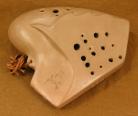Xun

To order, contact us at info@imperialcityocarina.com, letting us know your location (country), postal code (zip code), xun model, and any custom requests.
The xun 埙 is played similar to a western flute, in the sense that air flows partly into and partly across the windway opening. Good tonal quality on the xun requires development of a proper embouchure. As with the western flute, the higher the note the tighter the required embouchure. Thus, ocarina players will find that the xun takes some getting used to early on. But with practice, the full range of this wonderful instrument can be mastered!
The sound quality of the xun is more mellow and distant-feeling than the ocarina with a slightly windy sensation, creating for many listeners a dreamy sense of drifting off to another place and time.
Traditionally, xun have had no fingering provision for sharps and flats, requiring the player to half-cover toneholes to achieve a fully chromatic scale. But now, Song Wei's new design offers complete chromatic fingerings.
These instruments have no neckcord hole and must be held solely with the hands without neckcord support while playing.
We now refer to our xun in C as a bass instrument, though we continue to call the D xun an alto.
Our bass G xun is especially low, playing an octave below an alto G ocarina.
Xun origins. The xun is an ancient Chinese vessel flute made of clay or ceramic. The first 3-tonehole xun were made during the Xia Dynasty (ca. 2070 to 1600 BC). Later on, at the time of the Shang Dynasty (1600 to 1046 BC), xun took on the familiar flat-bottomed egg shape, being made not only from ceramic but also stone or bone. More toneholes were added over the centuries, but basic design of the xun remains simple (excepting of course Song Wei's new innovations). Like the ocarina, pitch is determined by vessel volume and tonehole diameter.
How in the world do you say "Xun"?!! That's a problem for Western tongues because we don't make the sounds indicated by "xu". The closest I can render "xun" for the native Englsih speaker is shwoun, where the ou is pronounced as in "should". To hear a short sound clip of "xun" in a standard Beijing pronunciation, click HERE (accept the download and your media player should open automatically).









